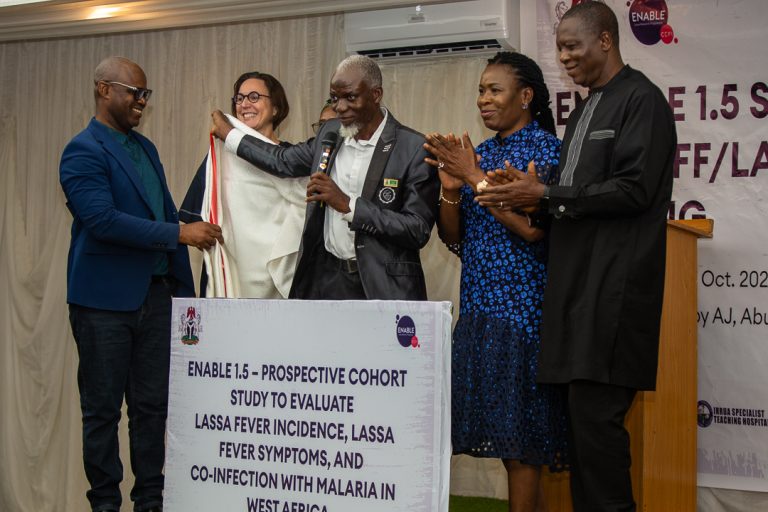Scientists in Nigeria are expanding their research into deadly Lassa fever with the launch of a pioneering study designed to gain a better understanding of the variation in disease symptoms and how these compare to malaria and other infections prevalent in the region.
The new research, led by the Nigeria Centre for Disease Control and local study sites, is part of Enable, the world’s largest Lassa fever study initiated by the Coalition for Epidemic Preparedness Innovations (CEPI) and partners. Enable aims to provide a more accurate assessment of the disease burden in West Africa and support outbreak preparedness efforts, including the development of a Lassa vaccine.
Dr. Muhammad Ali Pate, Coordinating Minister of Health and Social Welfare of Nigeria, stated, “Lassa fever remains a public health challenge in Nigeria and West Africa, but our commitment to research and innovation is yielding promising progress.
The new Enable research will deepen our understanding of the virus and enhance efforts to develop the first-ever Lassa vaccine, safeguarding the health of our communities. The Federal Ministry of Health and Social Welfare remains dedicated to collaborating with our partners and neighboring nations to advance these efforts and mitigate the suffering caused by Lassa fever.”
The year-long study will invite five thousand healthy participants, including children and infants, beginning this month at sites in Nigeria (Edo, Ondo, and Ebonyi states), with plans to expand to Sierra Leone and Liberia in subsequent weeks.
While Lassa fever poses a significant public health burden in the region—with potentially hundreds of thousands of annual infections—many cases likely go unreported due to challenges in detection. Most individuals infected with the Lassa virus are believed to exhibit minimal or no symptoms, contributing to underreporting.
Those who do experience symptoms such as fever, headache, and chills may be misdiagnosed with diseases like Ebola, dengue, or malaria, which present with similar nonspecific symptoms.
Dr. Richard Hatchett, CEO of CEPI, emphasized, “Incomplete detection of Lassa fever cases not only affects our understanding of the true incidence rate and resource needs to respond effectively but also jeopardizes the assessment, deployment, and acceptance of future Lassa vaccines.”
The new research aims to improve scientific understanding of the frequency of Lassa fever, variations in infection rates and symptoms across different locations, age groups, genders, and prior exposure to the virus, as well as the prevalence of post-infection symptoms such as hearing loss. Researchers will also investigate co-infections of Lassa fever and malaria, which can complicate disease management.
“Insights into the spectrum of disease symptoms will enhance our comprehension of Lassa fever, categorizing cases into mild, moderate, or severe,” added Dr. Richard Hatchett.
“This information will be critical in guiding the location and methodology of future late-stage vaccine trials and determining priority groups for receiving the Lassa vaccine once it is licensed in the coming years.”
Recent modeling studies estimate that introducing a Lassa vaccine could save 3,300 lives across the region over a decade. The most advanced Lassa vaccine candidate is currently undergoing Phase 2 trials in West Africa.
Elsie Ilori, National Project Coordinator for Enable in Nigeria, remarked, “The launch of this expanded Lassa fever study marks a significant step in our ongoing efforts to understand and combat this devastating disease.
Through in-depth investigations into variations in Lassa fever symptoms and their comparison with other prevalent infections in the region, we will gain valuable insights to improve diagnosis, enhance outbreak preparedness, and inform future vaccine development.
This study will contribute to reducing the burden of Lassa fever in Nigeria and West Africa, saving lives and strengthening our health systems.”
Dr. Jide Idris, Director General of Nigeria Centre for Disease Control and co-chair of the Nigeria Lassa Vaccine Task Force, commented, “This expanded investigation represents important progress in our fight against Lassa fever.
By enhancing our ability to detect and diagnose cases and preparing for future vaccine development through the study of disease symptoms and their association with other infections, we are shaping health policies and promoting public health across Nigeria and West Africa. Our global and local partners are instrumental in advancing efforts to reduce the impact of Lassa fever and prepare for a future where its deadly effects can be mitigated.”
Formally diagnosed in Nigeria in 1969, Lassa fever is a potentially fatal disease primarily transmitted to humans by infected Mastomys rats. While many infections are asymptomatic, the disease can lead to severe symptoms, particularly in pregnant women, and has a mortality rate of around 1% on average.
The World Health Organization has identified Lassa fever as a priority pathogen requiring urgent Research and Development (R&D) attention.
CEPI launched Enable in 2019, with over 23,000 participants from across West Africa involved in the research to date. Initial data collected up to 2024 is expected to be published in the coming months. Beyond increasing knowledge of the disease and its prevalence in the region, Enable is enhancing the capabilities of study sites and preparing them for future epidemic and vaccine research, including potential support for upcoming Lassa vaccine trials.
